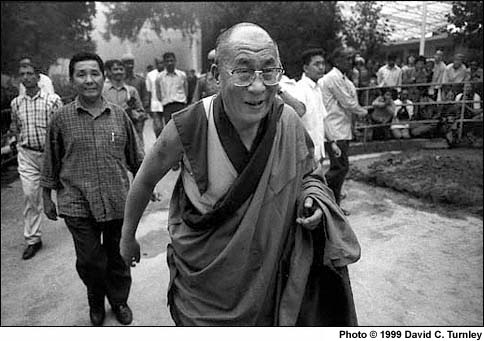 |

|
 |

|
| Photojournalist David Turnley has been
on the scene of many of the great world-shaping events of the past two
decades. He won the World Press Photo in 1986 for his coverage of South
Africa under apartheid, the Armenian earthquake of 1988, the collapse of
communism in Eastern Europe, the massacre in Beijing, the Gulf war in Jordan,
Saudi Arabia and Kuwait, and most recently the refugee exodus in Kosovo.
He has won the NPPA Newspaper Photographer of The Year, the Overseas Press
Club Robert Capa Gold Medal, and the Pulitzer Prize.
Despite having a career most photographers would die for, in recent years, David has found that the space available for the publication of his work, has been gradually slipping away, as magazines have curtailed the number of pages they have been willing to give "hard news." This frustration has led to experimentation with video as an adjunct to his still photography. Late last year he approached CNN with an idea...suppose he was to take a digital video camera along with his stills and try to talk the Dalai Lama into letting him do a week long photo and video essay. Like so many of David's subjects, the Dalai Lama agreed, and the result was not only the photo essay that we present here, but a one hour television special. Since then, David has attended the Platypus Workshop, along with his twin brother Peter, to expand his knowledge of video journalism. Since his graduation alongside 30 other still photojournalists, both Turnleys have been turning out distinguished television journalism. Peter combined stills and video for a moving segment on Kosovo for CNBC, and David has aired two shows on NIGHTLINE, one on the Kosovo crisi and another on Winnie Mandela. The Turnleys are representative of a new breed of visual journalists as they reinvent themselves for the 21st century. We are proud to present the still photographs
, accompanied by David's RealAudio commentary on the Dalai Lama, at home
in exile.
His Holiness the 14th Dalai Lama, Tenzin Gyatso, is the head of state and spiritual leader of the Tibetan people. He was born Lhamo Dhondrub on July 6, 1935, in a small village in north eastern Tibet. Born to a peasant family, His Holiness was recognized at the age of two, in accordance with Tibetan tradition, as the reincarnation of his predecessor the 13th Dalai Lama, and thus an incarnation of Avalokitesvara, the Buddha of Compassion. Almost a half a century ago, Chinese troops invaded Tibet, bringing to a sudden and violent end Tibet's centuries old isolation beyond the Himalaya's. Tibet's unique brand of Buddhism formed the core of Tibetan culture and society, a radical contrast to the atheistic and materialist dogma of the Chinese communists. In the wake of the invasion, the Dalai Lama, Tibet's spiritual and temporal leader, and nearly 100,000 Tibetans fled into exile in India. In the years after, Tibet's remarkable culture, and its inhabitants, have been systematically persecuted. Alexander Solzhenitsyn described China's rule in TIbet as "more brutal and inhuman than any other communist regime in the world." Since 1960, the Dalai Lama has resided in Dharamsala, India, known as "Little Lhasa," the seat of the Tibetan Government-in-exile. |
| PAGE
1 | 2 | 3
| 4 | 5 | 6
| 7 | 8
| 9
| 10 | 11 | 12
13 | 14 | 15 | 16 | 17 | 18 | 19 | 20 | 21 | 22 See the Index Page | Hear David Turnley's audio |
| Contents | Editorials | The Platypus | Links | Copyright |
| Features | Camera Corner | War Stories | Dirck's Gallery | Comments |
| Issue Archives | Columns | Forums | Mailing List | E-mail The DJ |